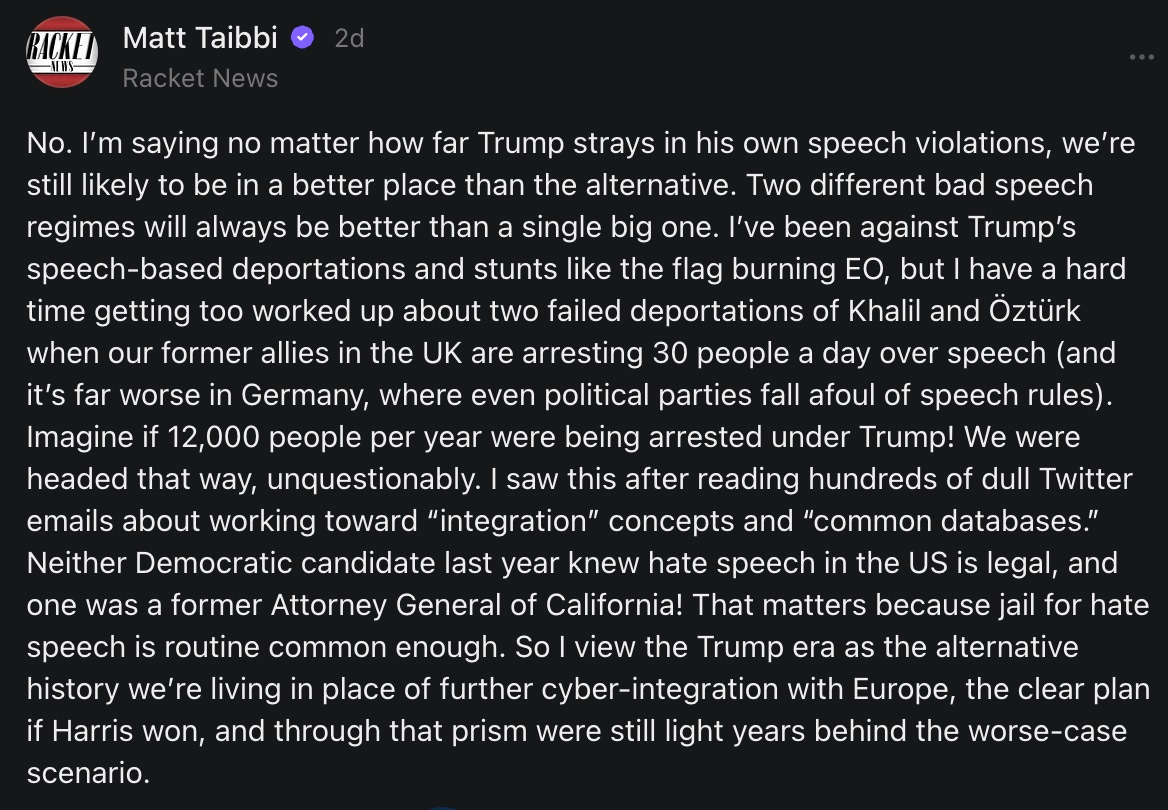CrowdSource is back from summer break!
Welcome to CrowdSource, your weekly guided tour of the latest intellectual disputes, ideological disagreements and national debates that piqued our interest (or inflamed our passions). This week: does the United Kingdom have a censorship problem? Do we?
Join us! CrowdSource features the best comments from The Crowd — our cherished readers and subscribers who, with their comments and emails, help make Wisdom of Crowds what it is.
London Calling (You’re Under Arrest)
American and British pundits are becoming increasingly agitated by censorship news from the UK: last week’s arrest of sitcom writer Graham Linehan for offensive posts on X; the ongoing suppression of Palestine Action; the arrest of a pro-life activist Livia Tossici-Bolt in 2022; etc.
Arresting Development. According to the Times of London, “the police are making more than 30 arrests a day over offensive posts on social media and other platforms. … officers are making about 12,000 arrests a year …”
Rules Britannia. Behind most of these arrests is the UK’s Online Safety Act of 2023, the Communications Act of 2003 and the Malicious Communications Act of 1988.
Self-Interest is Enough. A good summary of the UK censorship situation by Alex O'Connor: “The case for freedom of speech has not changed in hundreds of years, and even absent considerations of principle, can be made solely on account of self-interest.”
Meanwhile, in America:
Tu Quoque. A report from the New York Times about British criticisms of the US’ recent free speech record: “Yet Britain also just enacted a law that requires universities to provide broad latitude for free expression and academic freedom on campuses.”
Trump and American Universities. A primer by Cecelia Smith-Schoenwalder.
You Too. Having once supported it, Haisten Willis now criticizes Trump’s push against the press: “Most concerning have been recent actions targeting the bottom lines of major news outlets, which would threaten the existence of smaller ones if deployed against them with equal force.”
“Trump on Surveillance, Protest, and Free Speech.” A list of Trump’s attacks on free speech by the American Civil Liberties Union.
(Not Enough) Anarchy in the UK
Reflections on, and extrapolations from, the above:
“A More Censored Internet.” Taylor Lorenz fears that the rest of the world will emulate the UK: “The Online Safety Act is just the latest in a troubling global trend towards a more censored internet, within which governments and data harvesters have obliterated privacy and everything you do online is logged, tracked and monitored.”
“The Public Health Model of Speech Suppression.” Ashley Frawley argues that the UK government sees controversial speech as a public health issue: “ … supposed malefactors are no longer treated as citizens who have broken the law, but as contaminants to be isolated and neutralized.”
“Is Europe or Donald Trump’s America a Bigger Threat to Free Speech?” In an interview with UnHerd, a subsequent essay, and most directly in the Note below, Matt Taibbi wrestles with the question of whether the Trumpian/Muskian attacks on free speech are worse than the bureaucratic/liberal ones:
The Future of Censorship. Last year, Thomas Fazi meditated on growing structural incentives for government censorship:
As our societies degenerate into de facto oligarchies controlled by increasingly delegitimised political-economic elites, this manipulation of public opinion — not only through propaganda delivered via traditional mass media channels but also, increasingly, by policing and micromanaging the public conversation taking place on social media platforms — has come to be seen as an imperative for keeping the status quo safe from the threat of democracy.
Old and New
Background readings about censorship of different kinds:
Self-Censorship. In 1994, economist Glenn Loury wrote this essay, which was just republished in a new edition: “Conventions of self-censorship are sustained by the utilitarian acquiescence of each community member,” Loury wrote. “By calculating that the losses from deviation outweigh the gains, individuals are led to conform.”
“Self-Censorship in a Time of War.” Incidentally, Loury was fired from the Manhattan Institute for his criticisms of Israel’s war in Gaza, about which he wrote another essay: “If I can’t speak honestly about one issue, there is no reason for anyone to trust I’m speaking honestly about anything else.”
Areopagitica. In 1644, the English poet John Milton wrote a pamphlet in support of “unlicenc’d printing” and the free exchange of ideas: “Truth and understanding are not such wares as to be monopoliz’d and traded in by tickets and statutes, and standards. We must not think to make a staple commodity of all the knowledge in the Land …”
“Censorship’s Effect on Cultural Production in Early-Modern England.” Scientific findings from economists Peter Grajzl and Peter Murrell prove Milton right: “Censorship has a temporary chilling effect on the quantity of cultural production, with output recovering within a decade.”
From the Crowd
Our readers write about diplomacy and faith.
Confidence-Building. Critic and faithful Wisdom of Crowds reader George Scialabba — who has a new book coming out in January! — responds to Damir Marusic’s article about the upside of Trump’s transactional approach to diplomacy:
… the results of this kind of diplomacy was World War I, a civilization-destroying catastrophe in absolutely none of the participants' interest, followed by a peace settlement so badly bungled that another, even more catastrophic world war was inevitable, followed by a long period of nuclear-armed tension during which one or the other of the nuclear-armed powers, through accident or misunderstanding, repeatedly came close to destroying organized human life. Traditional diplomacy has been an utter, disastrous failure. Is tht what you're recommending.
As usual, your tough-minded conclusions are exactly wrong. Only painstaking confidence-building, transparent at every step, and based on the explicit recognition that international competition is wholly irrational and that weapons of mass destruction are too dangerous to allow any state to possess, offers any hope of long-range survival.
You can pre-order George’s book, The Sealed Envelope: Toward an Intelligent Utopia here!
Against the World, For the World. An interesting reflection from John Wilson on our recent podcast about American culture and the Latter Day Saints:
… anytime the church leans too far into the world and forgets to stay out of it, you start to see secular culture contaminate the holy. Alternatively, the benedict option falls into too much naval gazing and will probably just grow into a weird cult.
As Christians, you gotta have both. We are exiles in Babylon. We need to world to challenge us to be what we claim to be, and we have to see it for the broken place it is, in need of restoration.
See you next week!
Wisdom of Crowds is a platform challenging premises and understanding first principles on politics and culture. Join us!






Appreciate the consistently good Mon am notes Santi. Also, enjoyed your Hope Axis discussion. The end of the world is nigh, so WoC is simply chronicling….
Such a touchy issue speech. Will all the free speech absolutists please stand up?
On the other hand. Is porn a freedom of speech? Maybe speech stops at social decency laws, and we put it to actual majority vote and let the crowd decide what is sacred.
As for online trolling. Speech isn't speech if it belongs to Anonymous. Sites should censor things people want to do anonymously, because the medium is impossible to manage otherwise. I mean if you want to print some tracts with a pen name... that should be allowed, but if it's the same thing as the internet, then I wonder what the distinction can be.
Thanks for the shout out!